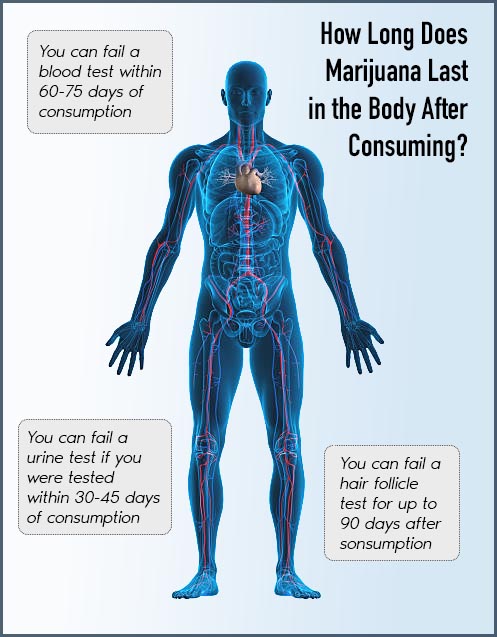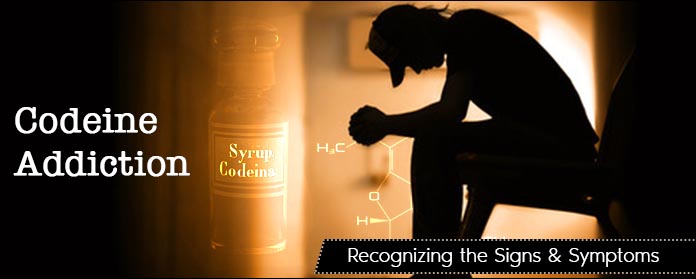If you use marijuana on a regular basis, you might be wondering what the signs of marijuana use disorder look like and you might also be asking the question, “how long does marijuana stay in your system?”
- Marijuana stays in your system for quite a while after you consume it.
There’s a misconception out there that marijuana is not habit-forming. In reality, though, research suggests that approximately 30 percent of those who use marijuana suffer from some kind of marijuana use disorder.
How Long Does Marijuana Last in the Body After Consuming?
After consuming marijuana in any form, the effects tend to dissipate within a few hours. Because of this, some people assume that the drug leaves their system very quickly. That’s definitely not the case, though.
You can fail a urine test if you were tested within 30-45 days of consumption. You can fail a blood test within 60-75 days of consumption, and you can fail a hair follicle test for up to 90 days after last consuming it.
As with other drugs like alcohol (yes, alcohol is considered a drug), there are a lot of factors that influence the length of time marijuana stays in your system. Some of these factors include the following:
- The frequency of marijuana consumption
- THC concentration levels
- Method of consumption (edibles are metabolized more slowly than products that are smoked or vaped)
- Your unique metabolic rate
- Body weight and body fat percentage (THC is stored in the fatty tissue of the body)
The use of other drugs can also influence the amount of time marijuana stays in the body. Drugs that slow down the metabolic rate will cause marijuana to linger longer than it may have otherwise.

Signs of Marijuana Abuse
If you’re wondering about the length of time that marijuana stays in your system, you might also have concerns about whether or not you’re using marijuana too frequently.
Any drug has the potential to be abused, including drugs like marijuana that have potential medicinal benefits.
The following are some well-known signs of marijuana abuse and marijuana use disorder:
- Perception distortion
- Coordination impairment
- Cognitive and problem-solving difficulties
- Learning and memory problems
- Frequently red or bloodshot eyes
- A constant, mucus-filled cough
- Increased heart rate
- Increased appetite
- Dry mouth
- Feelings of anxiety or paranoia
- Slowed reaction times
If you are overusing marijuana, you will also experience withdrawal symptoms when you go too long without it. Some of the most common withdrawal symptoms include:
- Mood swings
- Irritability
- Insomnia
- Decreased appetite
- Increased anxiety
- Profuse sweating
- Tremors
Marijuana withdrawal symptoms usually present themselves within 24 to 72 hours after your last use. The withdrawal symptoms peak within a week of stopping marijuana use and tend to diminish after that.
Long-Term Effects of Marijuana Abuse
For some people, long-term marijuana abuse can lead to long-term health problems.
Individuals who abuse it for long periods of time may experience mood swings, panic attacks, memory loss, and learning difficulties. They may be more prone to lung infections and respiratory diseases, too.
The bigger problem here, is that many people use marijuana to overcome or cope with other issues affecting them, such as depression, insomnia, work or family anxieties, and a whole host of matters that are difficult to deal with sober.
Like alcohol, marijuana serves as a pleasant escape mechanism for daily problems and at first, it is used only occasionally, as needed to get through a tough day. But after repeated use over a long period of time, it becomes habitual and users begin to use it daily.
As the days stretch into months and years, smoking pot is necessary just to feel normal and happy. It becomes almost impossible to experience any joy without getting high. The body builds up a dependence and addiction soon follows.
Overcoming Marijuana Addiction
If you think you may be abusing marijuana and developing an addiction to it, it’s important to seek help right away.
As with any kind of drug addiction, the first step to getting help is admitting that you have a problem and are abusing marijuana.
Next, you need to seek support from a qualified professional.
Depending on the severity of your symptoms, you may need to spend time participating in an inpatient or outpatient rehabilitation facility.
While participating in a rehab program, you will have support as you go through the detox process and begin your recovery. You’ll also have access to mental health professionals who can help you identify the root causes and teach skills to cope with those triggers so you are less likely to relapse.
After you’ve finished your stay in a rehab facility or completed an outpatient program, don’t assume that you’re out of the woods.
The real test, after this, is living in the “real world” and resisting temptation. After rehab, it’s best to work with a therapist or join a support group to stay focused on your goals and surround yourself with likeminded individuals.
Speeding Up the Detox Process
For many people who are struggling with marijuana use disorder (or an addiction to any drug, for that matter) the most challenging part of the recovery process is the detoxification period.
Detoxing from marijuana can definitely be unpleasant, which is why it’s important to work with a professional to avoid any serious effects.
There are a few different strategies you can use to speed up the detox process and lessen the withdrawal symptoms you’re likely to experience. Some of the most effective strategies include the following:
Get Plenty of Sleep
During the detox phase, you may feel lethargic and fatigued. Let yourself sleep as much as you need to so that your body can begin recovering and repairing itself.
Stay Hydrated
Drinking plenty of water is essential during this period, too. Water helps to flush out toxins and keep the body’s detox pathways working efficiently.
Eat a Healthy Diet
Eating a healthy, balanced diet plays a big role in efficient detox, too.
Steer clear of foods and beverages that can cause inflammation and digestive problems. This includes highly processed foods or foods high in sugar.
Instead, eat lots of fruit and vegetables and stick to high-quality protein sources and healthy fats like olive oil and avocado.
Exercise
Be sure to exercise regularly, too. The more you sweat and move your body, the faster your metabolic rate will increase and the easier it will be to detox and get the toxins out of your system.
Get Help Today
There are a lot of factors that influence the effects marijuana has on you, so there’s not a clear answer to the question, “how long does marijuana stay in your system?”
However, you can lessen the effects of marijuana addiction by prioritizing your health during the detox phase and seeking support from a qualified professional.
Check out the Drug Addiction section of our website today to learn more about the signs and symptoms of addiction to marijuana and what you can do about it.






